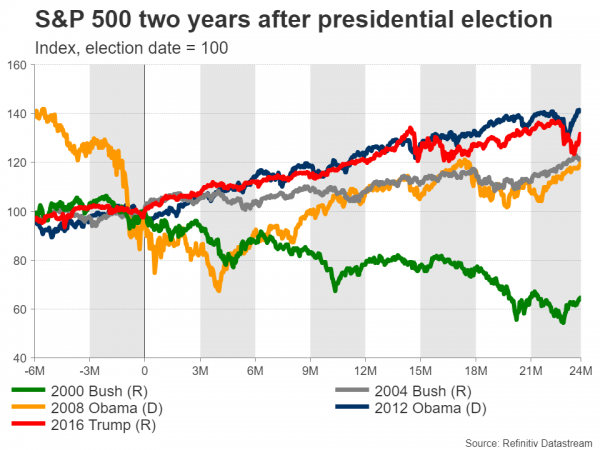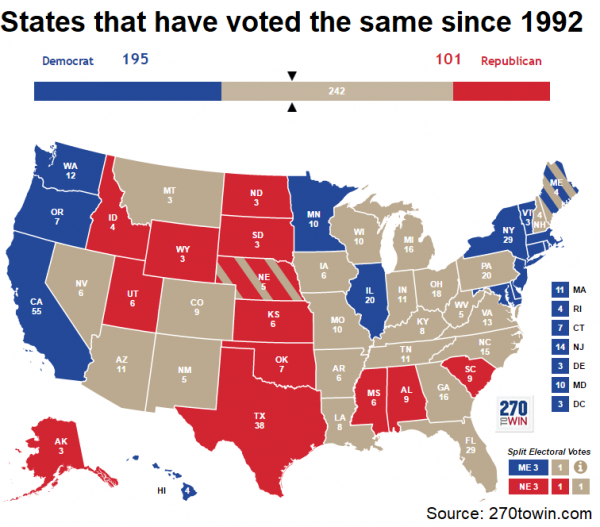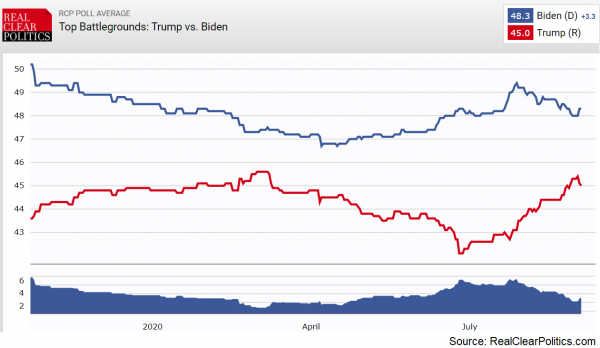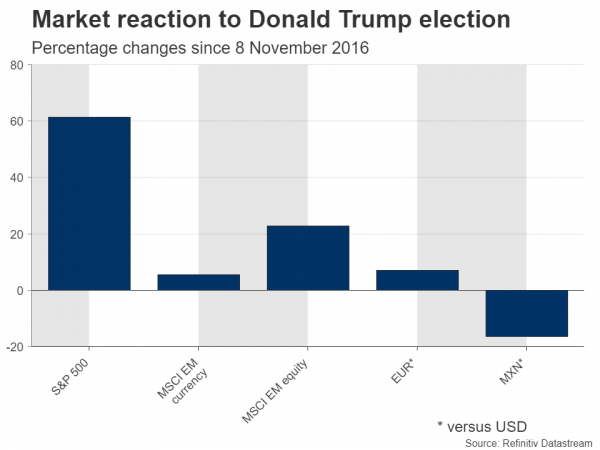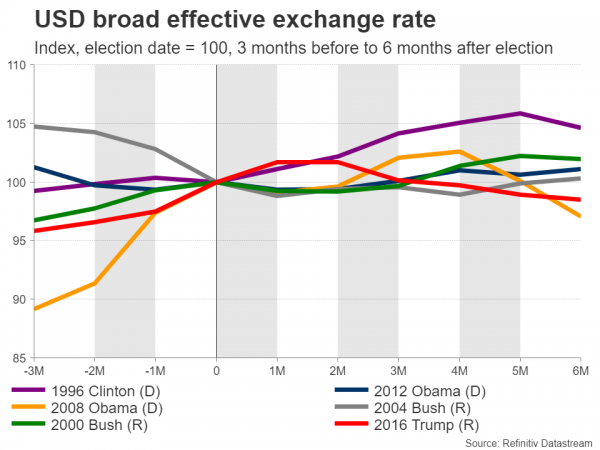The 3rd of November is the day that American citizens will decide who will lead their country for the next four years. Opinion polls suggest Biden will win, but Trump is quickly closing that polling gap in key battleground states and betting markets imply that the race is too close to call. In this piece, we examine how the complex US voting system works, what makes it different from other countries, and how markets might react ahead and after the election.
An election system like no other
The US election process is quite unique. It is an indirect process, meaning that the president is not chosen directly by the people. Yes, Americans do go out on Election Day and vote for their preferred candidate, but when they cast their ballots, they are actually voting for a group of people called “electors”. It is this group that elects the president.
There are 538 of these electors in total, so the magic number needed to win the White House is 270. Each US state gets a fixed number of electors based on its population, so the most populous states have a bigger say over who wins.
The crucial part is that this is a winner-take-all system. Whoever gets the most votes in a state becomes the candidate that state officially supports and receives all the electoral votes of that state. In other words, it does not matter whether you win a state by a hair or a mile – you still get all the electors that state has to offer.
This also explains why someone might win the ‘popular vote’ but still lose the overall election, as Hillary Clinton found out in 2016.
Not just a presidential election
Another key element of the US election system is that it is not just about choosing the next president. Voters will also be electing new members of Congress. The US Congress is made up of two chambers: the House of Representatives and the Senate. All the House seats will be up for grabs this time, alongside one third of the Senate.
For something to become law, it must be drafted and passed by the House, approved by the Senate, and then signed by the President. If any of these three bodies does not agree, that law does not pass, so each body has ‘veto’ powers.
This is crucial because it implies that just winning the White House is not enough. If you want to implement your agenda as president, you also need to control Congress, otherwise you might get caught in a partisan gridlock where nothing gets passed. Remember Obama’s second term?
That said, the president can issue executive orders that become law without Congressional approval, but these are usually limited in scope. Specifically, the commander-in-chief has a lot of autonomy on foreign policy and trade issues, but very little on domestic economic matters, which require Congressional oversight.
Only a few states really matter
America only has two major political parties, the Republicans and the Democrats, and most US states lean heavily towards one of these parties. California for example is a Democratic stronghold, while Texas is a Republican fortress. As such, candidates usually focus their energy on a dozen so-called ‘battleground’ states, which are not loyal to any single party and thus usually determine the election outcome.
Florida is the largest of these unpredictable ‘swing’ states, and the most important. The candidate that won the Sunshine State has also taken the White House in every presidential race going back to 1964.
Focus on the right polls
This is one of the main reasons why looking at general opinion polls is almost pointless. What matters most is the battleground states. In this race, Biden is leading Trump by 7 percentage points nationwide according to the average of polls tracked by RealClearPolitics, but if one looks at just swing states, that gap narrows to just 3 percentage points.
Moreover, the trend is that Trump is catching up, which is also the narrative in betting markets. Betting odds imply that the race is now neck-and-neck, even though Biden still holds a commanding lead in the polls. Why? The emerging narrative is that opinion polls are underestimating Trump because his supporters are more likely to lie about their preferences or refuse to be polled altogether.
Having said that, these betting markets are extremely small, so they are quite untrustworthy. One large bet could skew the entire picture. Remember that on the night before the 2016 election, Clinton had a 75% chance of winning.
How markets might react
While it is hard to call an election’s result, it is even harder to predict how it might affect markets. It is not just who wins the presidency, but whether they also hold the House and the Senate, how strong their majority is in those chambers, and what their policy priorities are.
Even so, let us outline each candidate’s flagship policies, and lay out some potential scenarios.
One of the key differences between the two contenders is tax policy. Biden says he wants to partially reverse some of Trump corporate tax cuts, raise the capital gains tax, and invest in green energy.
In isolation, these imply that a Biden win could spell trouble for the stock market, especially for energy stocks. Higher taxes could be lethal because if one excludes Apple, Amazon, Microsoft, Facebook, and Google from the S&P 500, the index has posted almost no earnings growth for half a decade now. Trump’s tax cuts were therefore a major force behind equity gains in recent years.
On foreign policy, a Biden win might ease some tensions with China. Biden is not exactly soft on China, but he is softer than Trump, and rejects his unilateral tariffs. Hence, a Biden victory could lead investors to price in less political volatility, boosting the yuan and the currencies of nations with high exposure to China, like the Australian dollar.
Dollar is a trickier affair
As for the dollar, its reaction is trickier. It all depends on how the outlook for more government spending changes. The US government deficit has already exploded, so any hints for more mass-scale spending might be negative for the dollar. The Republicans are theoretically more fiscally conservative than the Democrats, so a Trump win might be beneficial for the dollar, while a Biden victory might hurt it.
But it is not that simple, because a lot will also depend on whether Congress is divided. At the moment, the Democrats hold the House and the Republicans control the Senate. If Biden wins the White House but does not flip the Senate too, all his spending proposals will be vetoed by the Republicans, so the dollar might not lose much. In other words, only in the case of a ‘Democratic sweep’ does the dollar stand to lose big. The same applies to the stock market.
All told, this race has not shaken financial markets yet, but that could change quickly. Politics will likely overshadow economics over the coming weeks, and investors might begin to respond to any fluctuations in opinion polls well ahead of Election Day.

